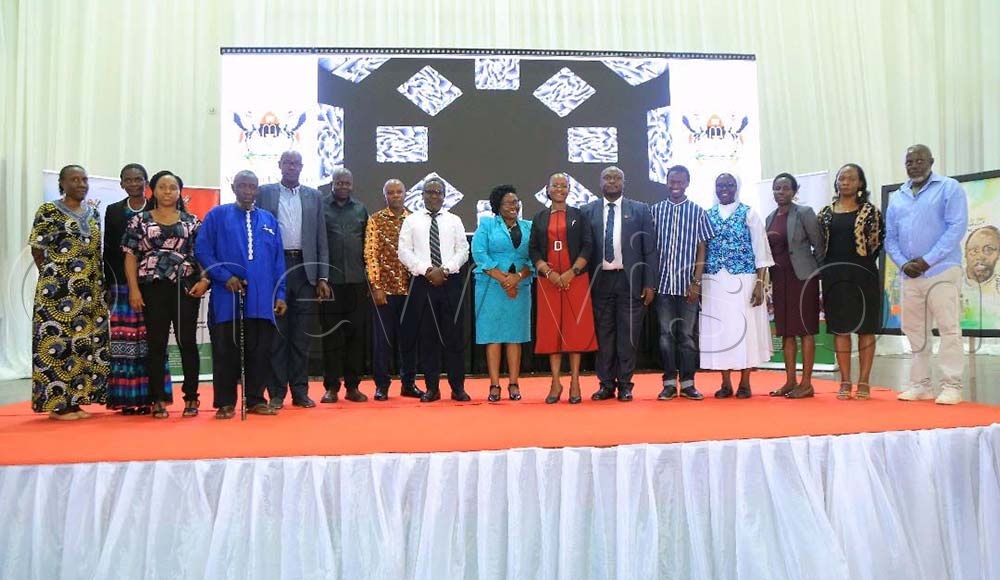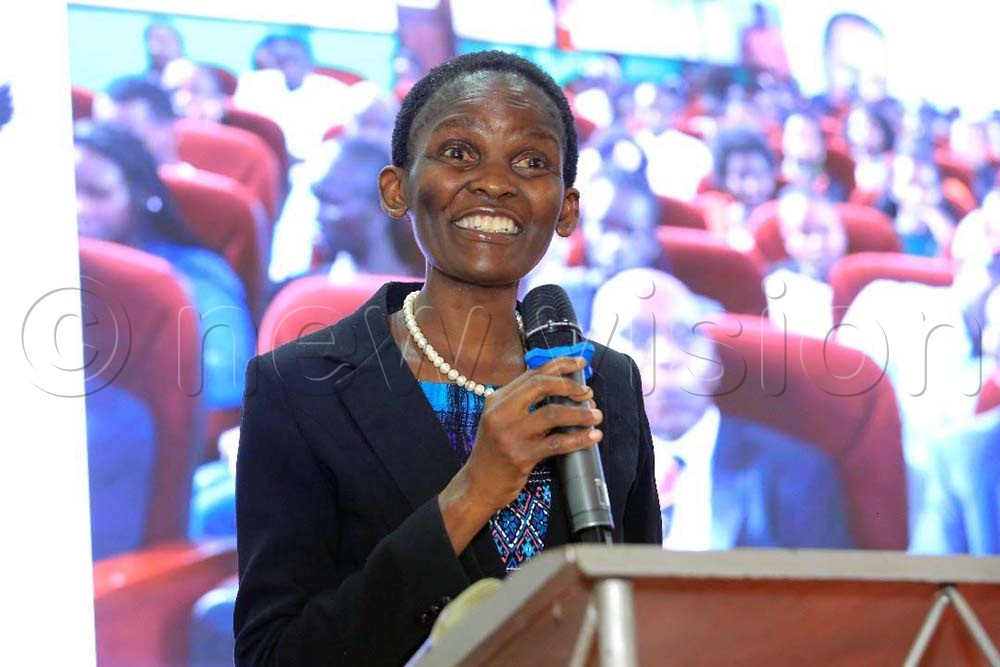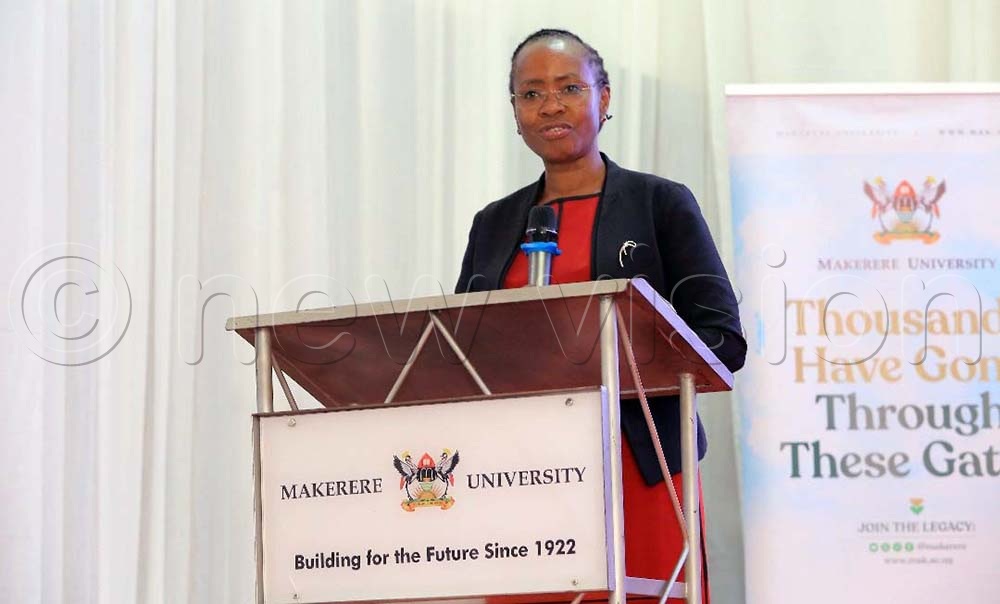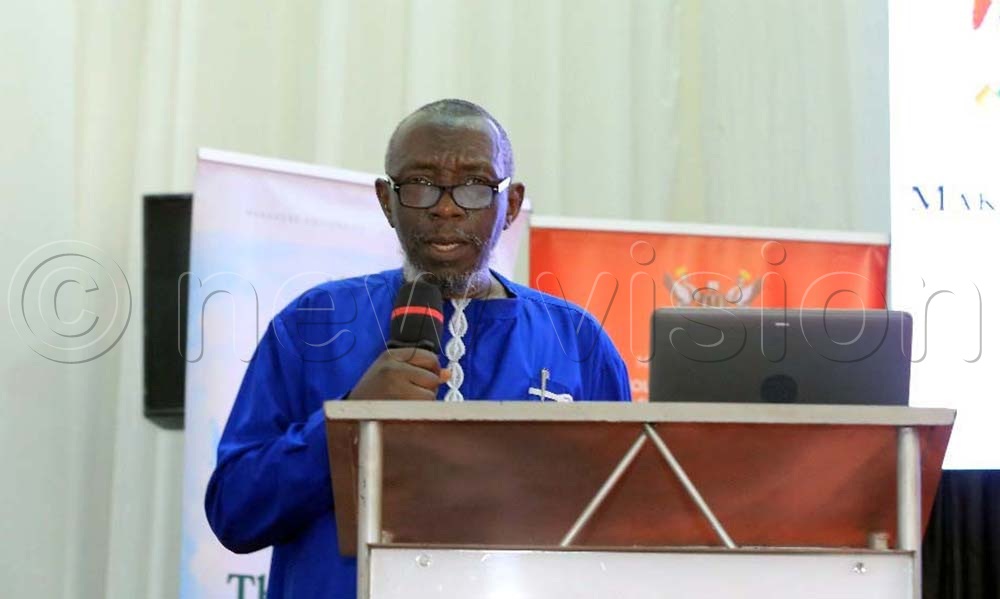Makerere University honours legacy of Ngũgĩ wa Thiong'o
Kiyimba described Ngũgĩ wa Thiong’o as one of Africa’s most formidable literary and intellectual figures whose life and work span more than six decades from the dawn of independence through the turbulent postcolonial years to the ongoing era of global cultural decolonisation.
Guests, officials, students and participants at the Ngũgĩ wa Thiong’o Memoriam held at Makerere University’s Main Hall. (Credit: John Odyek)
Key guests, officials and participants at the Ngũgĩ wa Thiong’o Memoriam held at Makerere University’s Main Hall. (Credit: John Odyek) Prof. Susan Kiguli, a lecturer from the department of literature at Makerere University addressing the audience at the Ngũgĩ wa Thiong’o Memoriam held at Makerere University’s Main Hall. (Credit: John Odyek) Prof. Sarah Ssali the deputy vice chancellor in charge of academic affairs, representing vice chancellor Prof. Barnabas Nawangwe at the Ngũgĩ wa Thiong’o Memoriam held at Makerere University’s Main Hall. (Credit: John Odyek) Prof. Abas Kiyimba, a lecturer in the department of literature at Makerere University, delivering a keynote address at the Ngũgĩ wa Thiong’o Memoriam held at Makerere University’s Main Hall. (Credit: John Odyek)
KAMPALA - The Department of Literature at Makerere University has paid tribute to the celebrated writer Ngũgĩ wa Thiong’o, recognising his enduring influence as a novelist, theorist, and activist. Ngũgĩ was lauded for his pivotal role in advancing debates on language and identity in African literature.
The homage was held on 22nd October 2025 at Makerere University’s Main Hall as part of the Ngũgĩ wa Thiong’o Memoriam.
Prof. Abasi Kiyimba, a lecturer in the Department of Literature at Makerere University, delivered a keynote address titled “Ngũgĩ wa Thiong’o – The Writer as Witness, Warrior, and World Citizen.”
Kiyimba described Ngũgĩ wa Thiong’o as one of Africa’s most formidable literary and intellectual figures whose life and work span more than six decades from the dawn of independence through the turbulent postcolonial years to the ongoing era of global cultural decolonisation.
He said Ngũgĩ’s journey mirrors the evolution of modern African literature itself, a story marked by resistance, creativity and the enduring struggle to liberate the African mind.
He explained that the keynote was both a celebration and a reflection tracing Ngũgĩ’s journey as a witness to his people’s history, a warrior for their dignity, and a citizen of the world.
For Makerere University, however, the remembrance carried a deeply personal meaning. Makerere was Ngũgĩ’s literary cradle, the place where a young James Ngugi first found his voice and produced his earliest works, including The Black Hermit, The River Between, and Weep Not, Child.
“Makerere was the place where his lifelong conversation with Africa and the world began,” Kiyimba said, adding that Ngũgĩ’s time at Makerere from 1959 to 1964 marked the beginning of a remarkable creative journey. “This is not just an academic remembrance, it is a homecoming of the spirit.”
Kiyimba noted that in his memoir Birth of a Dream Weaver: A Writer’s Awakening (2016), Ngũgĩ wa Thiong’o wrote extensively about his days at Makerere University. He described how Makerere offered him space to experiment, create, and grow, and how the university’s Main Hall and Lecture Room Four in the Arts Court became the launching ground for his literary journey. It was on this campus, Ngũgĩ recalled, that he made his first public speeches, staged plays and received honours that marked the beginning of a lifelong calling.
Speaking about Ngũgĩ the family man and human being, Kiyimba said that beyond his public stature, Ngũgĩ was also a deeply private individual, a devoted husband, father and mentor who nurtured creativity within his own family.
Between his two wives, Nyambura and Njeeri, they raised 10 children, at least six of whom became writers. Despite occasional public disagreements, particularly with his son Mukoma, the literary talent within the family reflected the power of example, how literature, when lived rather than merely taught, can become an enduring heritage.
“For Makerere University, Ngũgĩ remains an inspiration,” Kiyimba said. “His journey from the Makerere of 1959 to the global stage of literature reminds us that great ideas often begin in humble classrooms. To our young scholars and students: Ngũgĩ’s life teaches that literature is not a luxury, it is a way of seeing, of being and of freeing the human spirit. As we celebrate Ngũgĩ, let us not merely echo his words but continue his work by writing, teaching, and thinking in ways that affirm our commitment to the cause of our languages, our communities and our continent.”
“Ngũgĩ wa Thiong’o’s life was a long poem written in courage, faith and imagination. He gave us stories that continue to speak to our times. He reminded us that the writer’s duty is to remember, to resist and to renew. Ngũgĩ was the kind of man who told truth to power, and if power did not listen, he would write it down, publish it, and make sure the whole world listened instead.”
“Even those who never read his work will remember him for something,” Kiyimba said.
“In that way, he joins the small circle of artists whose names will not fade with time.
Let us celebrate him not as a departed hero, but as a living ancestor, the griot (storytellers) of the modern world, the keeper of the African word, the eternal Makererean. May the work you did thrive and the languages you fought for continue to flourish.
Kiyimba reflected on the profound influence of Makerere University on Ngũgĩ wa Thiong’o, recalling the colonial atmosphere he encountered there and his early resistance to racial prejudice. Despite the challenges, Ngũgĩ flourished creatively writing plays, short stories and novels that set the stage for his global literary career.
He shared personal memories of discovering The River Between as a student, describing how the novel, alongside Okot p’Bitek’s Song of Lawino and Chinua Achebe’s Things Fall Apart, awakened a lifelong passion for African literature. A later encounter with Ngũgĩ revealed his lasting affection for Makerere and his devotion to promoting African languages.
Ngũgĩ’s transformation from “James Ngugi” to “Ngũgĩ wa Thiong’o” was described as an act of self-liberation his rejection of colonial identity and assertion of cultural pride. His decision to abandon English for Gĩkũyũ and Kiswahili marked a turning point in his lifelong struggle for intellectual independence.
The keynote speaker emphasised Ngũgĩ’s belief that language is the vessel of identity and memory, knowing one’s mother tongue brings empowerment, while ignorance of it leads to enslavement.
Citing Ngugi’s exchanges with critics such as Dr Obi Wali, a Nigerian literary scholar, the address traced Ngũgĩ’s journey from early English-language works to his revolutionary decision to write in African languages, even at great personal cost, including imprisonment and exile under the Moi regime.
Kiyimba hailed Ngũgĩ’s writing as both artistic and political a weapon of resistance and renewal. Through novels like Devil on the Cross and essays such as Decolonising the Mind, Ngũgĩ sought to “shift the centre” of literary power back to Africa. His legacy, the keynote concluded, lies in his vision of an Africa that reclaims its voice, its languages, and its place in global conversation.
Prof. Sarah Ssali, the deputy vice chancellor in charge of academic affairs, representing vice chancellor Prof. Barnabas Nawangwe, said that Ngũgĩ’s bond with Makerere and Makerere’s bond with him is one that even his death on 28 May 2025 cannot erase.
Ssali noted that Makerere nurtured his creative and scholarly abilities, with Ngũgĩ writing his first two novels while resident in Northcote Hall (now Nsibirwa Hall). During the year of Uganda’s independence, he wrote and staged The Black Hermit at the National Theatre, becoming the first African writer to do so, according to contemporary newspaper reports.
Ssali highlighted that Ngũgĩ actively contributed to newspaper columns, engaged in student politics, and fully participated in campus life.
Despite his discomfort with the colonial system, he used his writing to challenge oppression. His early novels, Weep Not, Child and The River Between, penned on Makerere Hill, showcased his storytelling skill, affirming African dignity and culture while reflecting on the struggles of his people.
Throughout his life, Ngũgĩ was a staunch advocate for African literature in African languages. In 1977, he formally renounced writing in English, committing to Gĩkũyũ, believing that reclaiming African humanity required writers to express themselves in the languages of their communities.
His activism came at great personal cost, including imprisonment and exile, yet he remained unwavering in his commitment to justice and liberation for Kenya, East Africa, and the continent.
Ngũgĩ last visited Makerere in 2013 to celebrate 50 years of the University of East Africa. He insisted on dedicating a day to visit his former Department of English, now the Department of Literature, reflecting his enduring connection to the institution. As one of his tutors noted in his undergraduate reports, Ngũgĩ “literally lived his subject,” remaining a lifelong fighter for human dignity, historical memory, and freedom.
Ssali noted that while his writing was fiery, Ngũgĩ was personally unassuming, always seeking to inspire others to live by their principles. His tutors predicted in 1963 that he “will certainly do the College honour in the future” a prediction he fulfilled and continues to embody even after his passing. Makerereans, she urged, should emulate his example as they “build for the future.”
Reverend Sister Prof. Dominica Dipio of the Department of Literature, College of Humanities and Social Sciences, Makerere University, said the name Ngugi should be celebrated for its enduring legacy.
“We are proud to associate ourselves with this name. Storytellers keep memories alive and pass them to the next generation. There is nothing more powerful than a name, and Ngugi’s will live on because it is the name of a storyteller. May we all care about the names we leave behind,” Dipio said.
Dipio noted that learning about the late Nigerian scholar Obi Wale’s death reminded her of the risks taken by those who stand for justice. “It challenges us, because when you choose to stand for something, sometimes you put your life on the line. Ngugi is among those who risked his life for justice,” she said.
She urged artists to value and wisely use their talents. “God has given us skills to speak to all categories of people. My prayer is that artists may be wise and inspired to use this special gift of storytelling to touch lives,” she said.
Prof. Susan Kiguli, a lecturer from the department of literature at Makerere University, described Ngugi wa Thiong’o as a celebrated writer and scholar whose work continues to shape post-colonial thought.
“Ngugi received numerous accolades for his creative and intellectual contributions. He was a strong advocate for examining the complex relationship between dominant and marginalised languages in post-colonial societies. His decision to write in Gikuyu in 1977 marked a turning point, and he remained committed to promoting African mother tongues throughout his life,” Kiguli said.
She added that Ngugi’s influence remains powerful even after his death. “He is widely recognised as one of Africa’s most prolific and influential literary figures who consistently spoke truth to power. His voice remains urgently relevant even in his physical absence. I am honoured to have met him several times. He was humble, gentle, and remarkably friendly,” she said.